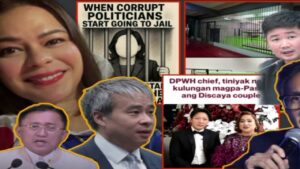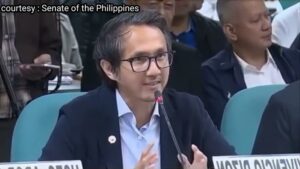The Philippine Senate has become the epicenter of a fierce national debate, bringing to light systemic corruption within vital government agencies, most notably the Department of Public Works and Highways (DPWH). Recent committee hearings have exposed a disturbing network of anomalies involving multibillion-peso flood control projects, implicating public officials, contractors, and even lawmakers. The public outcry for genuine reform and accountability has intensified, demanding a transparent, unyielding crusade against graft at all levels.

I. The Shadow of Irregularities: Senator Villanueva and the Flood Control Conundrum
The proceedings have cast a spotlight on the alleged involvement of high-ranking officials in questionable projects. Senator Joel Villanueva found himself directly addressing persistent claims and questions regarding the allocation of funds, particularly the controversial confidential funds and the anomalies surrounding flood control appropriations in his home province of Bulacan.
The atmosphere in the Senate was charged as Senator Villanueva, while expressing his full support for DPWH Secretary Vince Dizon’s efforts to clean up the department, detailed his long-standing frustration with the erratic and ineffective management of flood control projects in Bulacan.
A History of Misallocation: The Senator recounted that prior to 2023, Bulacan received little to no flood control funding, despite its critical need. Ironically, in 2023, a significant budget was allocated, but it was reportedly funneled into projects not aligned with any comprehensive master plan, worsening the province’s perennial flooding problem.
The Ghost Project Revelation: Citing reports from Secretary Dizon, the Senator mentioned the alarming figure of 497 ghost projects nationwide. He then pressed the Secretary to confirm how many of these non-existent or anomalous projects were specifically located in Bulacan, naming specific contractors allegedly involved in at least five cases already filed before the Ombudsman.
The Unprogrammed Funds Mystery: A key point of contention revolved around the unprogrammed released funds for 2023 and 2024. Senator Villanueva shared his “personal knowledge” of a specific instance where a district engineer, under oath, admitted to manipulating a lump-sum appropriation into a specific flood control project, naming a legislator—the Senator himself—without that legislator’s knowledge or consent. This revelation, which was affirmed by a DPWH official to be against proper procedure, highlighted a severe vulnerability to abuse within the system of unprogrammed funds, sparking the Senator’s strong reservations against their continued inclusion in the national budget unless significant safeguards are implemented.
II. The Commitment to Accountability: A New Era of Enforcement
Amid the revelations of widespread corruption, the government is taking decisive steps to signal its seriousness in holding the perpetrators accountable.
The New Quezon City Jail: The preparation of a dedicated wing at the New Quezon City Jail (QCJ) in Payatas for officials, contractors, and engineers involved in the flood control scandal serves as a powerful symbol of the government’s commitment to equal justice. Interior Secretary Jonvic Remulla confirmed that the facility is ready, equipped with regular detention cells—no special VIP treatment—for those who will be indicted by the Sandiganbayan, the special anti-graft court. This move targets the highest-ranking officials who might be found culpable, including senators and congressmen.
DPWH’s Reform Agenda: Secretary Vince Dizon has been lauded for his active role in pursuing accountability, terminating contracts linked to entities implicated in the anomalies, and cooperating with various agencies like the Ombudsman and the Independent Commission for Infrastructure (ICI). The DPWH’s internal investigation has confirmed that out of 8,000 inspected flood control works, hundreds were initially flagged as “ghost projects,” some of which were not only useless but actively harmful, exacerbating flooding.
III. Senator Bong Go’s Call for Justice and Social Infrastructure

Following Senator Villanueva’s line of questioning, Senator Bong Go voiced his own strong condemnation of the corruption, emphasizing the betrayal of public trust and the disastrous impact on the Filipino people.
Against Unprogrammed Appropriations: Senator Go echoed the sentiment against unprogrammed appropriations, branding them as being “prone to abuse and corruption” and functioning like a “semi-pork barrel.” He urged the Senate Finance Committee to consider their removal from the budget.
The Crusade Against Corruption: He appealed directly to Secretary Dizon to remain steadfast and impartial in the pursuit of justice: “Seek the truth only and do not rely on any script… Imprison the truly corrupt.” He stressed the need to target the real masterminds and hold everyone accountable, from implementers and contractors to proponents and legislators.
Prioritizing Social Infrastructure: Senator Go, as the principal author of the Ligtas Pinoy Centers Act (Republic Act No. 12076), shifted the focus to the critical need for mandatory evacuation centers. He pointed out the staggering contrast: $1.2 trillion was allocated to flood control from 2022 to 2025—a budget that could have funded 60,000 evacuation centers—yet the actual allocation for Ligtas Pinoy Centers remains minuscule. He urged the DPWH to prioritize the construction of these vital centers, acknowledging their necessity for disaster-stricken communities.
The Plight of Health and Sports Facilities: Senator Go also raised concerns over the implementation of Super Health Centers and other health infrastructure projects, which the DPWH is mandated to implement if the cost exceeds $5 million. Citing operational issues and delays, particularly due to the late signing of the Memorandum of Agreement (MOA) with the Department of Health (DOH), he suggested streamlining the process by directly entering into a MOA with Local Government Units (LGUs) to expedite construction and ensure these facilities become operational, rather than becoming “white elephants.” Furthermore, he called for the prioritization of the repair and maintenance of sports facilities, such as the Rizal Memorial Sports Complex and the Philsports Complex, to support national athletes.
IV. Moving Forward: Systemic Reforms and Transparency
The Senate hearings collectively highlight that the crisis is not merely about individual acts of corruption but about deep-seated systemic flaws. The DPWH’s decision to remove flood control projects from the 2026 budget—a move supported by the President—was explained as a necessary measure to prevent further corruption and ensure that no project moves forward without a clear, integrated master plan. The department affirmed that efforts to mitigate flooding will continue through other means, including a massive, private sector-backed effort planned for the Greater Metro Manila area, including Bulacan, while the planning process for a legitimate flood control master plan is underway.
The immediate request by Senator Villanueva for copies of technical standards, master plans for the 18 major river basins, and cost breakdowns for flood control projects signals a clear push for greater transparency and accountability in planning and implementation. The promise by Secretary Dizon to comply with these requests immediately reinforces the collaborative effort to establish new mechanisms and ensure that the reforms discussed are swiftly and effectively put into place.
This legislative scrutiny marks a critical juncture in the nation’s fight against corruption. The focus is now on concrete action: ensuring that the truly corrupt are held to account in the newly prepared detention facilities, that future infrastructure spending is protected from abuse through the elimination of ambiguous funding mechanisms, and that public funds are redirected toward genuinely beneficial social infrastructure that serves the immediate needs of the Filipino people. The time for rhetoric is over; the demand is for swift, decisive, and structural reform.





